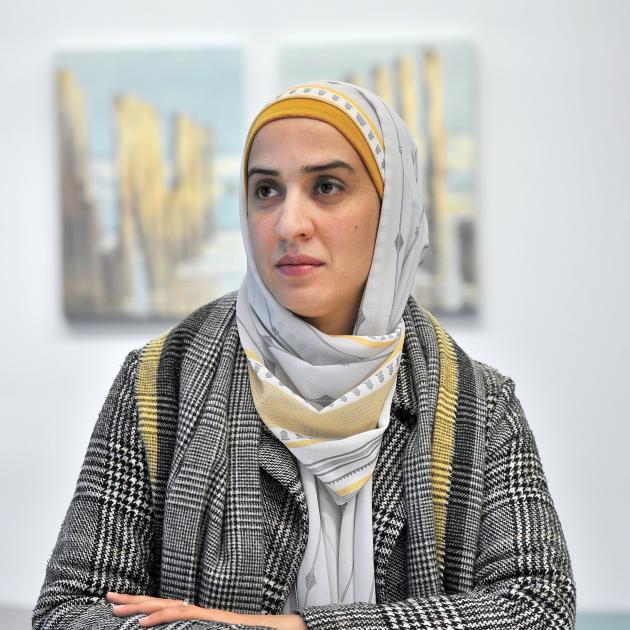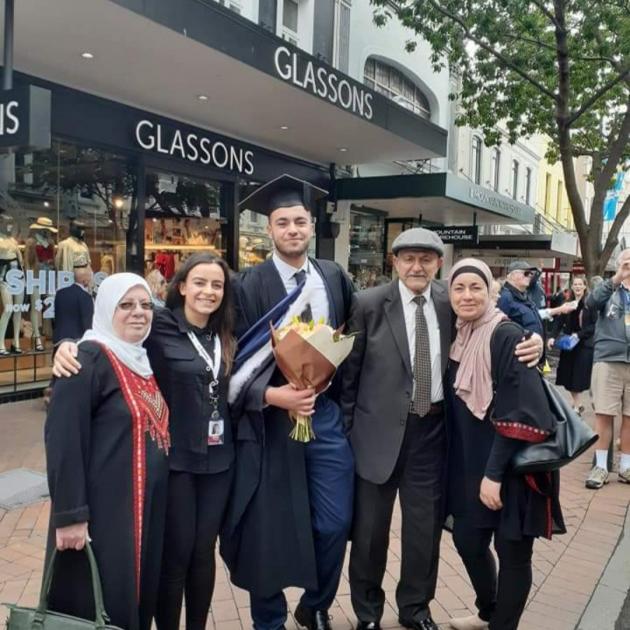
A lot has changed in the past year.
For some Dunedin Palestinians, the past 12 months have been marked by the deaths of nearly a hundred of their family members as they live day to day with an unthinkable mental burden.
They would give anything to bring their families to safety.
Since the war in Gaza began on October 7 last year, Palestinians living in Dunedin have repeatedly urged the New Zealand government to establish a special humanitarian visa so they can bring their families to safety — a plea that is backed by the Dunedin City Council.
They say what the government has offered them at present is expensive, contradictory and does not provide their families with a long-term reprieve from the conflict.
This option, a visitor visa, only allows for an up to six- or nine-month stay in the country and requires evidence of a "genuine intention" to leave once the visa expires.
Mai Tamimi and Rasha Abu Safieh are two members of Dunedin’s Palestinian community who, like many, have family members who are desperate to flee war-torn Gaza.
While not at the heart of the conflict themselves, they have experienced nearly 12 months of uncertainty and stress, which has taken its own toll on them.
"We always say that physically speaking, we’re here," Dr Tamimi said.
"Mentally, emotionally, we’re not here.
"We just count days."
In May, the two women spoke at a Dunedin City Council meeting where councillors subsequently voted 14-1 on a motion calling on Immigration Minister Erica Stanford to urgently establish a special visa for family members of the New Zealand Palestinian community affected by the war in Gaza.
The motion called for her to "make every diplomatic effort to ensure safe passage for these family members out of the war zone".
Dunedin Mayor Jules Radich sent a letter in June addressed to Ms Stanford requesting that she urgently establish the visa, noting these had previously been established for Ukrainian and Afghan citizens who sought refuge with their family in New Zealand.
Ms Stanford replied to the letter later that month, acknowledging the suffering experienced by the people of Palestine, but said at this stage they were not looking at providing a special visa pathway.
Mr Radich emailed Ms Stanford again in July requesting a meeting with her for him and Dr Tamimi.
The email outlined Dr Tamimi’s background as a Member of the New Zealand Order of Merit and her deep understanding of migrant communities including the Syrian, Ukrainian and Palestinian communities.
But the only reply from Ms Stanford was to say she had pressures on her diary and could not meet them.
Dunedin city councillor Christine Garey, who has started a petition to grant humanitarian visas to families of Palestinian New Zealanders, says this was "disrespectful" to both the Palestinian community and the office of the mayor.
"For her not to meet with Mai ... she missed an opportunity to get information on the ground.
"She’ll be being told one thing by her immigration people, but this is the reality."
Labour has also issued a letter-writing campaign calling on the minister to extend visas to families of Kiwi Palestinians.
Labour Taieri MP Ingrid Leary said it was "cruel to brush off the request" and "utterly disrespectful" to the community not to even meet its leaders.
Ms Stanford also stated in her letter that New Zealand provided support for refugee crises through the refugee quota, of 1500 people per annum, as referred to it by the United Nations High Commissioner for Refugees (UNHCR).
But Dr Tamimi said Palestinians could only apply for the quota from an area where the United Nations operated, and there was no UNHCR presence in Palestine — something she could have told the minister had she agreed to meet her in person.
Mrs Abu Safieh said it was disappointing that this request and the voices of their community had not been heard, and her "gut feeling" was that Ms Stanford perhaps did not understand what she was talking about.
"To shut the door before even allowing us to sit around the table was hard."
After presenting at the council’s meeting back in May, Dr Tamimi said she had spent more than an hour talking with her father and answering his questions.
She would also ask her mother daily how she was feeling and if she was doing OK.
"She would ask me the same question.
"She would always tell me, ‘if you’re OK, we’re OK’.
"They take that hope from us ... I think maybe they know how stressed we are and how concerned we are about them, but they can see hope with us being here and our families being here safe.
"Even those conversations we’ve been having with them on a daily basis, they give them hope."
Dr Tamimi said a visitor visa was not an appropriate solution for their families’ circumstances, as it contradicted the bona fide premise that visitors would come and ultimately leave.
Humanitarian visas had been provided for the Ukrainian and Afghan communities in the past and it could be "easily replicated" for their families.
The Palestinian community was not seeking any financial support from the government and members were struggling to understand why a humanitarian visa had not made available to their families.
"We just want them to be with us," Dr Tamimi said.
"We just want to see them, we just want to help them — we just want to make sure they are safe."
Mrs Abu Safieh said they had been requesting humanitarian visas for nearly a year now, but there was "always something that is not enabling the government to respond to our request".
Their community were only requesting humanitarian visas for their most immediate family and loved ones.
She estimated this totalled about 500 people for the whole country and about 50 for Dunedin.
A visitor visa was "not a pathway at all", she said.
"What’s a humanitarian need more than genocide, losing homes, losing work, losing family — losing everything?
"There is not even a place to go back to — Gaza is like 70-80% destroyed.
"We have family just in the middle of nowhere with no hope, with no life, with nothing."
The ministerial office of Erica Stanford did not respond to questions by deadline.
A petition to grant humanitarian visas for whānau of Palestinian New Zealanders is available to sign at https://change.org/specialvisa
Rasha’s story
Rasha Abu Safieh learned that her 12-year-old cousin was dead through social media.
She was killed in an airstrike over her tent in early September, bringing the number of her extended family members Mrs Abu Safieh estimates have already been killed in the war to a total of 75.
"One of the most beautiful young ladies ... She’s just a 12-year-old, and just gone."
Mrs Abu Safieh was raised in a refugee camp in Jabalia, north of Gaza, before moving to Gaza City and then to Dunedin about five years ago with her husband and three children, aged 16, 14 and 7.
The mental toll the conflict had inflicted upon their community was "massive" but was something they felt like they were not allowed to talk about, given they were physically safe in New Zealand.
With the help of the Dunedin community, her family amassed $75,000 to pay a private company in Egypt to evacuate 10 of her family members from Rafah to Cairo.
This included both her parents and in-laws, aged in their 60s and 70s, who could not work and depended on them as their only source of support.
With them were her four nieces and nephews, aged between 2 and 14.
Mrs Abu Safieh said she and her husband had had about three meetings to date with Immigration New Zealand, and were told to apply for visitor visas every time.
At these meetings, the latest of which was in July, she said she was told the length of stay on a visitor visa was between three and six months.
Applying for visitor visas for her 10 family members, in addition to the cost of medical support and other cost-of-living pressures, would cost about $100,000 in total, she estimated.
This amount could otherwise be used to allow her family "to live with dignity" in Cairo temporarily for another year, with the hope another option would arise.
"What I will pay for the process for three months, I can sustain them for one year.
"It’s like, what shall I do?
"Shall I waste this money with no hope, or shall I make sure that we give it to them at least to wait temporarily until something is happening?"

Mai’s story
Dr Mai Tamimi urged her crying mother to turn up the volume on the television to drown out the buzz of drones.
It was on the day her hometown of Hebron was declared a military zone, and she had been calling her parents repeatedly.
"I kept calling and calling until we knew that Israeli occupation forces targeted the person they were after and they killed him."
After that, the noise disappeared, and she said her mother felt a little better.
Dr Mai Tamimi, MNZM, travelled from Hebron, in the West Bank, to New Zealand with her family 16 years ago on a PhD scholarship to the University of Otago.
She gave birth to her third child while doing her PhD and was appointed as a member of the New Zealand Order of Merit for services to ethnic communities in 2022.
Dr Tamimi said their "relatively small" community in Dunedin of about 20 families felt as though they were not being treated as they should be.
The community had held about 40 protest marches from the Museum Reserve to the Octagon, many of which had been a weekly occurrence.
They were "always concerned" about their families, experienced survivor’s guilt and felt helpless that they could not do anything to bring them peace and safety.

They had been able to pool together enough money to fundraise for some families, including applications for visitor visas.
One Dunedin man had managed to bring his parents, sisters and brother to the city on his own finances last year, she said.
She knew of other Dunedin families who had applied for visitor visas, but had been rejected.
Having lived here now for 15 years, as a Palestinian community leader working in community development, she was a part of New Zealand, Dr Tamimi said.
She had always kept in the back of her mind that she lived "in the best country in the world" — where humans beings were valued for who they were and their contributions.
But she admitted she had become "kind of doubtful lately", given the issue of visas.
"Is it because I’m originally Palestinian I’m treated like [a] third or fourth or fifth-class citizen?
"I think that I have the right as a New Zealand citizen to bring my family to peace and to bring my family to safety."












